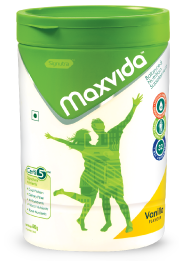
Menopause and nutrition
Around the mid-forties, a woman’s body gradually starts making less of estrogen, the female hormone. Gradually, monthly periods become irregular and eventually stop completely. Thus, menopause signifies the end of the reproductive years.1
Falling estrogen levels give rise to a number of menopausal symptoms such as weight gain, hot flushes, night sweats, irritability, poor concentration, more frequent headaches, and joint pains. Also, there is an increased chance of developing heart disease and bone weakness.2
Hot flushes is the most common symptom of menopause and interferes with quality of life in 15-20% women.3
Adequate nutrition and physical activity are very important in maintaining health and reducing postmenopausal symptoms.1,2,4
Nutritional management of menopause

Proteins:
Soy protein can control postmenopausal symptoms, promote bone health, and protect the heart. It also contains phytoestrogens, molecules which mimic estrogen. This can help reduce hot flushes. Good quality protein can be obtained from fish, poultry, lean red meat, eggs, dairy products, nuts, dried beans, peas, lentils, and soy.4

Fats:
Due to lower levels of the protective estrogen, women are at an increased risk of heart disease following menopause. Thus, it is important to reduce the fat content in the diet, especially foods containing saturated fat and/or high amounts of cholesterol.
A diet rich in essential fatty acids can help in reducing hot flushes and vaginal dryness and enhance the production of sex hormones. Essential fatty acids can be obtained from fish, fish oils, fresh vegetables, seeds, nuts, and vegetable oils.4

Vitamins:
Vitamins should be adequately included in the diet.

Minerals:
Following menopause, there is a loss of calcium, which can lead to bone diseases like osteoporosis. Osteoporosis increases the risk of fractures. Hence, adequate intake of calcium through foods like milk, cheese, and other milk products is recommended.4
Magnesium can relieve symptoms like heart palpitations, hot flushes, irritability, hyperactivity, insomnia, and anxiety. Foods rich in magnesium include green leafy vegetables, whole grains like oats, nuts, and almonds.4
|
Tips for managing menopause symptoms:4
|
How can a nutritional supplement help?
Healthy eating with all essential nutrients can help manage symptoms of menopause. But with a busy home and work life, getting adequate nutrition can be a problem. In such a case, having a supplement which can be consumed anywhere can be a great option for providing the missed out nutrients.

Our balanced nutritional supplement, MaxvidaTM, contains all essential nutrients such as complex carbohydrates, high quality easily digestible protein, and vitamins and minerals that may help meet nutritional needs in menopause. |

We suggest having 1 serving of MaxvidaTM, 2 levelled scoops prepared with water, twice a day, along with a nutritionally rich diet to help manage symptoms of menopause.
References: